
Messiah - My Testimony to Rev. Sun Myung Moon Volume II - Bo Hi Pak
|
|
Messiah - My Testimony to Rev. Sun Myung Moon Volume II - Bo Hi Pak |
Chapter 20 - The Summit Between Sun Myung Moon and Kim Il Sung [Part 4 of 5]
On the Way to Talks With President Kim
Chairman Yoon and Deputy Premier Kim met us at the airport in Pyongyang. They had something to report to Reverend Moon.
The Great Leader Comrade Kim Il Sung has said that he would like to meet you tomorrow. The meeting will take place at the official residence at Mah Jon in Hungnam, so we will have to leave straight away for Hungnam. This plane here has been prepared for your journey.
I was truly surprised. (Weren't these the ones who had to prevent a meeting between Reverend Moon and President Kim? And why of all places is the meeting to he held in Hungnam, the very place where Reverend Moon stood face to face with death for two and a half years?
As soon as the airplane lifted off, Deputy Premier Kim made a rather remarkable comment to Reverend Moon. "Mr. Chairman [Reverend Moon], I am not the kind of man who has ever believed in God," he said. "But now, there is no way that I can honestly deny God's existence. I'll tell you why. What is happening now is something that you couldn't achieve even if you planned for it. And, not only did we not plan this, but we even worked to prevent it, and yet, look at what is happening! Our Great Leader has said he will meet you in Hungnam! I just don't understand it. This is not the fruit of human efforts. If this isn't God's work, I don't know what is!"
Silently I thought to myself, "Oh, Heavenly Father! How profound You are! You are teaching them directly about Your existence, through revelations!"
I'm sure that President Kim had no inkling of the significance of his inviting Reverend Moon to meet in Hungnam. Perhaps there was some providential meaning? At any rate, such coincidences weren't likely to happen without God having played some role.
A long time later, we learned the background to President Kim's decision to meet with Reverend Moon. Actually, there was a big shock wave from Reverend Moon's explosive speech at the Mahn Soo Dae Assembly Halls on December 2. Chairman Yoon and Deputy Premier Kim were scared out of their wits. There was no way they could report the affair, and yet, there was no way that they could not report it. Nevertheless, one thing was completely clear to both of them. Reverend Moon should absolutely not be allowed to meet with President Kim.
Together, their unified conclusion was that they should uphold appearances of working to set up the meeting, while lavishing hospitality on Reverend Moon's group until they could send them on their way. If the outburst at Mahn Soo Dae were to be repeated when Reverend Moon met with President Kim, it would do them no good to have even a hundred heads; they would lose them all. But even more important, there was a chance that the shock to President Kim would he so great that he might even get a heart attack or something, which would he a disaster of the greatest magnitude.
When Chairman Yoon and Deputy Premier Kim were called in for a consultation with Kim Jong Il, they not only reported what had happened in detail but also criticized Reverend Moon's insolence and rudeness.
After Secretary Kim had listened quietly to the whole story, his response was totally unexpected.
"Really? What an interesting fellow! Reverend Moon, mmm ... Now that's what I call honesty. He's got guts, too. Yes, he is really something! A big man! The more I think about it, the more interesting he sounds. I'll report to the Leader and get him to meet this Reverend."
Yoon and Kim were beside themselves. They turned pale and voiced their opposition as strongly as they could. "No, no. He mustn't meet him! It would be terrible. It would be bad for the Great Leader's health."
Kim Jong Il replied sternly, "It's my responsibility now. It's not for you to worry about. The Great Leader wants to meet him even more." Neither of them could say anything. They had no choice but to leave the room.
On December 5, a phone call came from President Kim to Chairman Yoon. The president's instruction was for Yoon to bring Reverend Moon's group to Hungnam at 10 AM the next day. President Kim Il Sung added, "I heard everything ... that Chairman Moon said that he'd bring unification. So what? What does it matter who brings it, as long as it's unification?
I really like someone with guts like that." He let out a delighted laugh.
So in the end, President Kim passed Reverend Moon's test, and we found ourselves on the way to a meeting with the North Korean president.
Talks Between Reverend Moon and Kim Il Sung
We spent the night in Hungnam in guest accommodations, then set out at nine the next morning. Mrs. Moon, dressed in traditional Korean hanbok with a turumagi overcoat on top, looked elegant and refined. While we were being driven to the Mah Jon Presidential Residence (located in Mah Jon, Ham Heung City, Ham Kyeung Nam Do Province), we passed a huge industrial area on the right side of the road. In the next moment, I couldn't believe my eyes. Right beside the road was a large billboard reading "Hungnam Nitrogen Fertilizer Factory." This was where our Father spent two years and five months in a living hell. My heart filled with emotions.
"There must be a purpose," I reflected. "Perhaps God wants to vividly remind Reverend Moon of that terrible past -- there is so much to resent about that past -- so that he can forgive it all. Surely Reverend Moon would think like that, too. God wants to reveal the power of true love. He is telling Reverend Moon to meet Kim Il Sung with true love."
Our cars drove through the gates of the presidential residence and pulled up at the front entrance. No sooner had Reverend Moon stepped from his car and walked in but he was greeted by the enigmatic President Kim, a man all of us had only seen in pictures. As soon as Reverend Moon saw the North Korean president, he warmly embraced him. For his part, President Kim also embraced Reverend Moon effortlessly.
What a historical moment! This meeting was not the meeting of two enemies. No, it was a meeting of long-lost brothers. The two men held each other's gaze for a long moment. There was no room for petty thoughts or trivialities. There was only the joy of reunion.
Even now, when I look at a photograph of that embrace I am moved. It is truly a masterpiece. The event itself could only be described as a miracle. The scene was totally natural, warm, and beautiful. When I saw it take place, I went pale in surprise.
Later, as I was thinking about that moment, I asked Reverend Moon about it. "Abonim [Father], isn't Kim Il Sung your sworn enemy? How could you just embrace him so naturally and warmly?" Reverend Moon's answer was simple. "I met him with a parent's heart. In true love, there is no such concept as `enemy.' "
In truth, that one scene changed my life quite dramatically. When I think about that embrace, then there is nothing in the world that cannot be forgiven, there is no such thing as an enemy, there is nothing that cannot be endured. From the time of that embrace onward, I have endeavored to live my life according to that spirit.
After that warm embrace, Reverend Moon introduced his wife, Hak Ja Han Moon. President Kim greeted Mrs. Moon cordially, and the two of them shook hands. After that, Reverend Moon introduced the other members of his retinue to the president. Kim also shook hands with my wife and me. After the introductions were finished, President Kim walked with Reverend Moon down a long corridor toward the room where the talks were to be held.
Inside the conference room, President Kim took his seat at one side of the conference table. On his right sat Chairman Yoon, and on his left was Deputy Premier Kim. On our side of the table, Reverend Moon sat opposite President Kim, with Mrs. Moon on his left and myself and my wife on his right. Though this large table divided us, from the beginning the atmosphere of the meeting was friendly.
President Kim spoke first. "Chairman Moon and Mrs. Moon. I'm glad you have come. So, you have been to see your hometown, right? How was it?"
"Thank you for inviting Mrs. Moon and myself to the Republic," Reverend Moon responded. "Yes, we visited Jeong Ju yesterday. I was quite surprised that my old home is still standing. However, I cannot even begin to express how meaningful it was for me to meet my family after forty-eight years. And yet ... President Kim! Although I was overjoyed at yesterday's opportunity, at the same time, I could not help but also feel intense pain in my heart."
"Why is that?" asked President Kim, wondering.
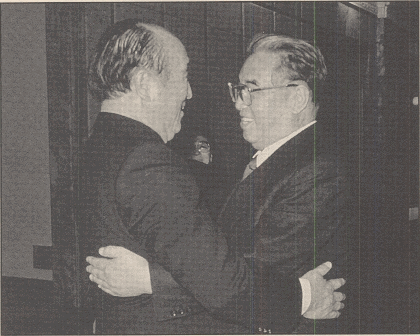
A historical embrace between North Korean President Kim and Reverend Moon on Dec 6, 1991.
"I myself am very happy to be able to receive this special opportunity, thanks to your kindness, Mr. President -- to visit the Republic and meet my family again. Yet at the same time, I could not but help think about the ten million families separated across North and South, about the innumerable compatriots who will get old and die never knowing whether their loved ones are alive or dead, and even if they know they are alive, have no way to be reunited with them. When I thought of this, even while feeling so much joy myself, I could not help but feel enveloped in a sense that it was wrong for me to experience this joy all alone. There is no greater tragedy to befall a people than our division,
"You and I share an important thing in common, Mr. President. We both love our people very much. Therefore, to add a historical note to my current visit to the Republic, I first of all want to ask that you might make it possible for separated families to experience the joy and benefits of reunion. This is what I would like to consult with you about."
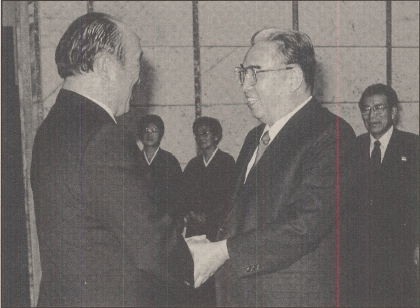
The two leaders hold hands in front of the presidential residence.
Thus Reverend Moon expressed his impressions of the visit to his hometown, then effortlessly tied it in to the issue of separated families. In this way, he pitched his appeal to President Kim Il Sung's humanitarian spirit and love of the Korean people.
President Kim nodded his head and listened carefully. "Chairman Moon," he said. "I feel the same way. Completely. From next year, let's start a movement for our compatriots in the North and in the South to meet with their families."
President Kim's answer took me totally by surprise. I never imagined we could have gotten such a clear and favorable answer on such an important issue, but the response rolled out as naturally as ice melting in the spring.
Now things began to warm up. Reverend Moon described several more dramatic examples of the tragedy of families divided by North and South, then brought his conclusion in the following way.
As you know well, I am not a government representative. Naturally, I am not authorized to speak for the government, and I do not pretend to do so. I am simply a religious leader. I believe that this problem must be resolved transcendent of politics. It needs to he resolved with a humanitarian perspective and with your spirit of love for our people, Mr. President. I have heard that there will presently be talks between the Republic and the South. Please, I hope you can send a trusted representative and see that the issue is discussed deeply at the current negotiations and that a favorable conclusion is reached.
President Kim's response was, "Absolutely. I think our representatives are supposed to meet with the representatives from the South in a few days' time. Is there any reason why we cannot talk about such things as fellow Koreans? Let's give it a go."
As far as the issue of the divided families went, we had obtained as good a result as we could wish for. Inside, I was shouting with joy, thinking that we had won the best possible gift to take back with us. Moreover, President Kim had indicated that substantial results could be expected from the next North-South talks.
Next, Reverend Moon changed the subject. "Apart from the love for our people, you and I share another important characteristic. Both of us long to see the unification of our homeland. Unfortunately, the division of our nation was decided upon by foreign powers at a time when our people were still struggling with issues of the past. Naturally, then, to achieve the goal of reunification, first our people have to develop the necessary strength of purpose and presence of mind. However, we also absolutely need the right conditions in the surrounding political environment. For that reason, I have worked, focusing on America, over the last twenty years to develop the setting for national reunification and help the formation of the necessary conditions in the surrounding nations. Let me explain just briefly about the work I have done in America."
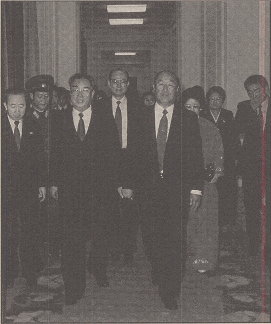
President Kim walked with Reverend Moon down a long corridor toward the room where the talks were to he held.
With that, Reverend Moon, turned to me and said, "Give us a brief report, Bo Hi." Finally I had my opportunity. I gathered my determination and started to speak. "President Kim, Chairman Moon currently maintains a foundation in 163 nations [in 1991; that number has since increased to 193 nations] around the world, and in the United States in particular his influence is very great. I believe that this was accomplished not by the power of human effort, but by the fortunes and Will of God and Heaven. Chairman Moon is now a friend of yours, Mr. President, and he is also a friend of the Democratic People's Republic of Korea. I believe you are very fortunate, Mr. President. In winning the friendship of Chairman Moon, you have gained much more than the friendship even a single nation could offer, and his friendship and support are a great hope for the cause of national reunification. Of this I am certain. At his direction, I would now like to explain to you about the work he has undertaken up until the present and about current political conditions in the United States."
"Yes, yes. I'm very fortunate, aren't I? Please go on," said President Kim, laughing aloud.
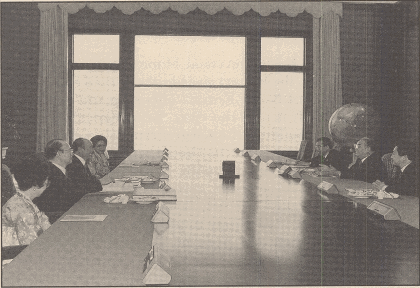
President Kim, Chairman Yoon, and Deputy Premier Kim (on the right); Reverend and Mrs. Moon, and Dr and Mrs. Pak (on the left) sit down for talks in the conference room.
I explained how Reverend Moon went to the United States, a place not particularly disposed toward Orientals, and established his foundation there. I also explained how he developed and implemented a powerful spiritual movement to revitalize the young people of America, who were by and large languishing from the bad effects of materialistic culture and decadence. Naturally, I did not forget to explain that Reverend Moon's ideology is Godism and headwing thought. Apart from this, I also described in detail the current American political situation, how the North Korean nuclear issue was of major concern, and about recent developments across the nation, in particular the U.S. Congress. I tied up my presentation in the following way:
In a recent interview with Chairman Moon, the well-known American newsmagazine Newsweek wrote that 'everything that Reverend Moon touches turns to gold.' In the United States, they even criticize him, saying say that Reverend Moon `brainwashes' the young people. Some people even think that he uses some kind of magic to turn around the minds of young people. All these criticisms actually testify to the huge influence and power that Chairman Moon wields.
Having listened with great interest, President Kim said, "Chairman Moon, how about you tell the secret of making everything you touch turn to gold, eh?" He laughed again, quite jovially.
Getting to the point, Reverend Moon continued: "As Dr. Pak just explained, the biggest issue in the United States these days is the matter of North Korea's obtaining and possessing nuclear weapons. It is only too clear that America's intention is to prevent the buildup of nuclear weapons on the Korean peninsula. At the same time, the United States currently thinks that the Korean People's Republic is determined to obtain nuclear weapons. As a result, certain opinions have arisen from the more hawkish sectors, saying that America should take military action if necessary to prevent that from happening. For starters, there has been no advance in agreements related to non-proliferation on the Korean peninsula, an issue that is currently drawing much attention. In particular, the United States is very suspicious of the fact that North Korea has yet to sign a Safeguards Agreement with the IAEA [International Atomic Energy Agency]," as a signatory of the Nuclear Non-Proliferation Treaty."
President Kim gave an unequivocal response. "Chairman Moon, please think about this for a minute. Why would I want to make nuclear bombs? Who would I kill? Perhaps you think I want to kill my fellow Koreans. Is that what kind of man you think I am? We have neither the intention to obtain nuclear weapons nor the ability to do so. However, if America wants to attack us because of this issue, you can rest assured my North Korean comrades would not sit still."
Reverend Moon countered right away. "Well then, all you need to do is remove the source of the misunderstanding.
The United States would never attack simply for the purpose of an invasion. It will be easy to remove the misunderstanding. All you have to do is agree to a declaration on a non-nuclear Korean peninsula, and sign the inspections agreement with the IAEA. That will solve your problem."
President Kim responded, "Nuclear energy must be used only for peaceful purposes. We want nothing else, so of course there is no reason to unnecessarily put ourselves in danger or to maintain such a misunderstanding. I will take care of it. Of course, I know you are thinking of our best interests. I've listened well, so we can expect things to turn out right, yes?"
Inside, I shouted for joy.
"No matter what happens, we have to make sure that no more blood is shed on the Korean peninsula," continued Reverend Moon. "That's why I advocate a peaceful approach to reunification. Even if it takes awhile to achieve it, if we can resolve the problem of the divided families and establish exchanges and cooperation between North and South, reunification will come about by the natural flow of events. Even if it means that it will take more time, I support a reunification that does not shed the blood of fellow Koreans."
As if he had been waiting for this opportunity, President Kim went into an explanation of his own particular theory of reunification, known as the "confederal formula" for unification.
"You have pointed out some very important things, Chairman Moon. I heartily agree with what you say. After all, that's why I advocate peaceful reunification myself. Reunification has to be done peacefully, right? That's why I suggest that we agree on `One Federation–Two Systems–Two Governments.' After we have gotten along for a while, we can go to the next stage when the right conditions for reunification are formed. What does it matter if it doesn't happen in our time, but in the next generation? We won't be around then, so the ones who take over from us will discuss the matter and work it out, right? We'll be someplace else, so I guess we'll just have to provide the applause when they do a good job, eh?
"I am always calling for more unity among our Korean people. It's just no good if we Koreans are ignored and disregarded by the foreign powers. What I'm saying is, let's all pull together, pool our resources -- those with money should give money, those with knowledge should give knowledge, those with power should give power -- and get unity among the Koreans. If we seventy million Koreans put our efforts together, what can stand in our way? Seeing as you're here, let's make it an opportunity to renew our resolution and make a new beginning. If we can expect this kind of spirit, then I'd be happy to agree to a summit meeting between North and South. There's nothing wrong with meeting President Roh Tae Woo and discussing reunification policy."
Reverend Moon listened carefully, attentively, and then responded. "President Kim, I'm deeply impressed with your spirit of love for our people. With such a spirit, what is there to prevent dialogue among the Korean people? And unity within the Korean people has to begin with dialogue. Up until now, the dialogue between North and South has been taken up only to be broken off and then broken off again, but I believe that the dialogue can enter a new stage from this point on. Of course, as I mentioned before, I do not represent any government authority. It is vital that the two governments sit down together and hold deep discussions and reach agreement in the same spirit as we are sharing now. Also, if you, Mr. President, came to Seoul and met with the leadership of the South, that would bring about great advances for the cause of peaceful reunification."
"Ah, yes. If you give me a call to go to Seoul, then sure I'd go. Of course, we'd have to develop a greater sense of mutual understanding between North and South, though. However, Chairman Moon, even if we wait for a bit on my visit to Seoul, I will work so that we see some fruit from the next North-South talks."
With a satisfied face, President Kim turned to Chairman Yoon. "What do you mean giving such a bad report about Chairman Moon when he is such a wonderful fellow?" he said in a scolding manner. "Change the records. Understand? As I see it, they were all wrong." Then he turned back to Reverend Moon and said, "Shall we go to the next room and continue our talk over lunch? It's strange, but I feel unusually good after meeting you today, Chairman Moon," and he got up from his chair.
Melting King Il Sung's Heart
The conference now moved from the conference room to the dining room. The other members of our group who had not attended the meeting were already seated. After President Kim took his place at the head table, Reverend and Mrs. Moon were seated on his right, while I was sat on his left, with my wife next to me.
The North Korean president briefly explained the menu. First, there was teul chuk (blueberry) wine, made from the blueberries harvested from Mount Packtu ("Mount White Head"), Korea's most revered mountain. Next, there was on kamja kooksoo (potato noodles), which Kim Il Sung explained was especially made to remind Reverend Moon of his hometown. The president also explained the origin of the dish, mentioning that he had often eaten it during the time he fought for Korean independence as a partisan guerrilla. There was also can-eo hwe (sweetfish sashimi), made from the sweetfish caught just north of where the Han River flows into the sea. It was clear that President Kim had put a lot of effort into extending his hospitality to Reverend Moon, going even so far as to design the menu. In a cheerful mood, President Kim raised his glass and proposed a toast to Reverend Moon's health and the reunification of Korea.
At the luncheon table, we discovered another side to Kim Il Sung. He was an expert in the art of conversation, with an almost limitless supply of topics. His story about the time he almost froze to death while hunting bear on Mount Pack Du brought bursts of laughter from everyone.
"Chairman Moon, I hear that you like hunting. Next time you come here, how about we go for a bit of hunting on Mount Pack Du?" In reply, Reverend Moon told us about his fishing exploits in Alaska. "I've heard that you like fishing, Mr. President. You can find huge halibut at Kodiak Island in Alaska. Why don't you come to America one time so that we can go fishing together?"
"If you invite me to come," said the president, "then sure I'll go. Perhaps I could also meet with America's president ... if you can introduce me."
Presently the conversation turned to our trip to Kumgang Mountain. "This was my first time to visit Kumgangsan," said Reverend Moon. "Of course, I was born and bred in Jeong Ju [close enough to visit Kumgangsan], but when I thought about how our nation was under foreign control, how we had no independence, how could I just have a good time sightseeing? Consequently, I had never been there. But now that I have seen it, I can say it is truly wonderful. They say that the American tycoon Nelson Rockefeller went there for his honeymoon, which just goes to show that even in America there are people who really appreciate Kumgangsan. The Kumgang range is really one of the best in the world. We Koreans should really be proud of it and develop it as an important tourist location."
"Kumgang Mountain is an important asset for our united homeland," said Kim Il Sung, taking up the topic. "I haven't allowed anyone to develop the area yet. I mean, if they do a bad job, the whole beautiful mountain group would be spoiled. The area really needs to be developed by someone like yourself, Chairman Moon, someone with a good eye and an international perspective. How about you take care of it? I think it would be good if you take care of Kumgang Mountain, develop the area."
"If that is what you want, I'll take responsibility for it," replied Reverend Moon. "Let's see if we can make the area into a top-notch international resort. I'll get the best people and the best technology in the world on it."
Here, the North Korean president pointed to Chairman Yoon, who was sitting on the other side of the round lunch table. "About the house that Chairman Moon was born in. The government has to keep it in good condition. That's my direct instruction. Got it?"
Chairman Yoon stood at attention and replied, "Yes sir. I understand, sir. That's what we will do." He looked like a vassal or minister addressing his king.
The luncheon drew on, and gradually the atmosphere became more family-like. "You have a most gracious wife, Chairman Moon," said President Kim, gesturing toward Mrs. Moon. "I hear that her hometown is in An Ju City (in North Korea, Pyong An Puk Do). They used to say, "Nam nam puk nyo" [A man from the south, a woman from the north], so that means that all the beautiful women are born up here, right?" Kim Il Sung let out a hearty laugh. Then, looking toward Mrs. Moon, he asked, "Are any of your folks at your hometown?"
Mrs. Moon replied, "Because I left our hometown when I was still very young, I don't really know who is there, but I would like to visit there at least once."
"When you come here next time, why don't you visit An Ju?" said Kim Il Sung. "After all, everybody only has one hometown, right? It's just human nature to want to see your hometown, isn't it?"
The whole luncheon was very familial, and a cheerful, harmonious atmosphere prevailed from start to finish. When the atmosphere had sufficiently ripened, Reverend Moon spoke. "I'm very happy that your health looks so good, President Kim. You are a bit older than me, so it's almost like you are my elder brother."
At that, President Kim raised his glass of blueberry wine and proposed another toast. "Mr. Chairman," he said. "Let's work together like hyeungnim and tongsaeng [elder and younger brother] and see if we can't do something really good."
If there was any moment when the last six thousand years of history have been resolved, then that moment was it. Finally, the cosmic-level Esau and cosmic-level Jacob had become completely one. It was the moment when cosmic peace was accomplished, when all the troubles and twists that had beset Heaven and the Will of God throughout human history were unbound, dispelled.
When the luncheon was finished and we moved outside to take photographs, President Kim and Reverend Moon were like two brothers. Reverend Moon held on to the North Korean president's hand tightly as they walked down the corridor. All the president's advisers and presidential residence staff turned pale in astonishment. Their expressions spoke clearly: "Who is this who dares to touch the flesh of our beloved Great Leader? That sacred and inviolable flesh ...
But President Kim's expression showed only joy.
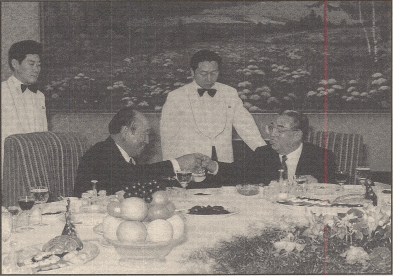
President Kim and Reverend Moon toast to their friendship.
The ones who had been most serious were of course Chairman Yoon and Deputy Premier Kim. I'm sure that they were completely terrified, and that for them, every second of the talks was like an eternity. But by the time the banquet came to a close, they let themselves relax, and you could see it in their expressions. They were comfortable, happy, and quite relieved. (To be frank, I'd say their expressions said, "It's over. We survived.")
They had also discovered another side to Reverend Moon, a side they had been ignorant of, and their surprise showed in their eyes. They were in awe at Reverend Moon's diplomatic skills, and it moved them deeply; not only had he covered successive important topics firmly and uncompromisingly, and said all he wanted to say, but he also somehow made President Kim happy and full of mirth. They had to admit he actually is a great man! They had been educated to think that only President Kim Il Sung was great, a giant among men. But that day, they discovered someone who was a match for the president, a man fit to rival him.
At a later time, Deputy Premier Kim expressed his thoughts on the matter. "Since I met Chairman Moon, I'm halfway convinced to become a Unification Church believer," he said. "I have never ever seen our beloved Great Leader so happy. I guess that, after all, it takes a great man to know one. Actually, I've come to believe that this visit by Chairman Moon to our Republic has brought us a tide of heavenly fortune."
So if the talks at the Mahn Soo Dae Assembly Halls could be described as explosive declaration, then the talks held that day at Mah Jon would best be described as sincere and honest persuasion; you could call it the melting of Kim Il Sung's heart. And when I look back, I wonder if this wasn't Heaven's strategy. Wasn't this the same heavenly strategy that Jacob used to melt Esau's heart? If we put a name to it, we would have to call it the "true love strategy." This strategy melted Kim Il Sung's heart, it presented him with a way to survive, it offered him a concrete program that could be followed, and it obtained from him everything that needed to be obtained. When you give true love to someone, that's what happens. Everything melts and pours out.
During the course of the photograph taking (a number of different photographs were taken), Reverend Moon did not once let go of President Kim's hand. This rather singular scene was later reported all over North Korea, both by television and in a front-page report in the Nodong Shinmun, together with photographs.
How much hope and comfort would this report and these photographs give to the twenty-five million citizens living in North Korea? The day of the meeting, a new chapter in history was created.
The leave-taking that day was made with much regret on both sides. One comfort to both men was their firm promise to meet again. However, who would have known that in fact this meeting was to be not only their first but also their last? At this point, I would like to record a simple summary of the various points that were agreed upon by the two leaders.
1. As a first step toward North-South unification, and as a single step advancing the development of humanitarian contacts, reunions of divided families will be implemented from 1992. Such reunions will begin with the elderly. The place and method of these reunions is to be decided upon by working-level talks between government representatives.
2. Nuclear energy must be used for peaceful purposes only, and North Korea will accept inspections by impartial international nuclear authorities.
3. Economic investment by all non-communist nations, particularly by people of Korean descent living overseas, will be welcomed by North Korea. Also, as a general principle, investment by the Tongil group (a large consortium founded by Reverend Moon) may participate in any and all peaceful economic enterprises within North Korea, with the exception of businesses of a military nature.
4. A summit is possible between North and South Korea if the leaders of both nations can discuss and make a determination concerning the method of national reunification.
5. Reverend Moon will undertake development of the Kumgang Mountain region.
This set of agreements and affirmations was unprecedented in terms of reunification diplomacy between North and South Korea, and the results were seen almost immediately in government-level developments. Right after Reverend Moon left Pyongyang, a North Korean delegation headed by Prime Minister Yon Hyon Took went to Seoul and signed the first major agreement between the two nations since the so-called July 4th Declaration in 1972. This new agreement, called the Agreement on Reconciliation, Non-aggression, and Exchanges between South and North, was signed December 13, only six days after Reverend Moon left Pyongyang.
On December 31, both nations signed the Joint Declaration on the Denuclearization of the Korean peninsula, thus addressing the nuclear issue that had repeatedly been such a source of friction. Finally came the change everyone had been waiting for. On January 30, 1992, North Korea signed a Safeguards Agreement with the International Atomic Energy Agency (IAEA), just as President Kim had promised Reverend Moon.
Is there anyone who can reasonably deny that these were fruits of Reverend Moon's foreign policy? No.
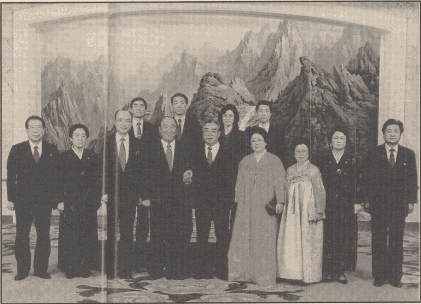
A formal portrait of the delegation against the backdrop of a painting of Diamond Mountain.